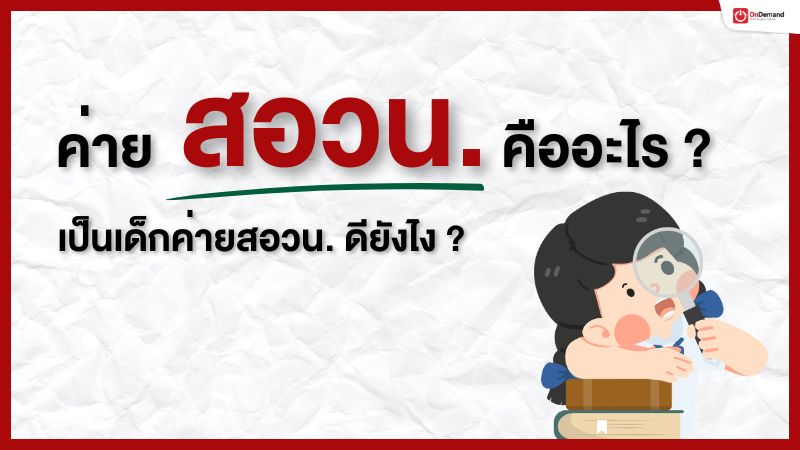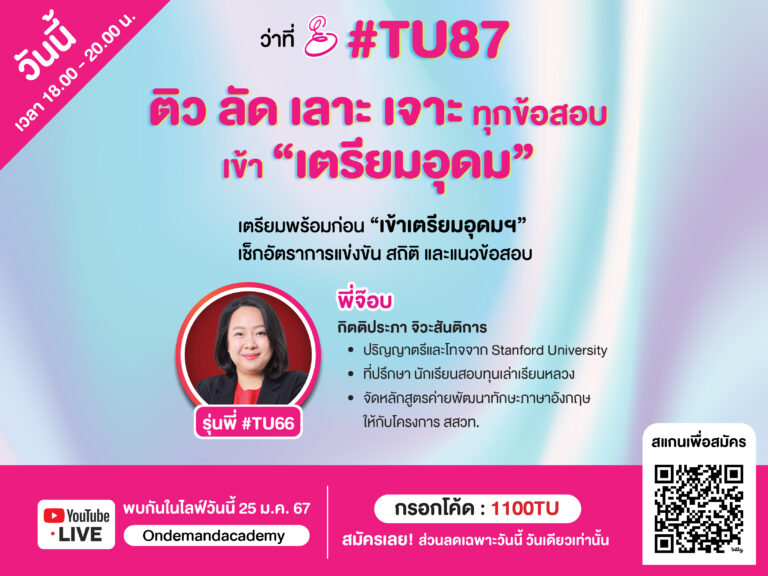
Verb หรือ คำกริยา เป็นหนึ่งใน Part of Speech ที่เรียกได้ว่ามีความสำคัญเป็นอย่างมากในการเรียน Grammar ภาษาอังกฤษ และเป็นสิ่งที่ข้อสอบภาษาอังกฤษส่วนใหญ่มักออกสอบเกี่ยวกับเรื่องนี้ ดังนั้นแล้วน้องๆ ควรทำความเข้าใจเกี่ยวกับเรื่อง Verb ให้ดี เพื่อเป็นประโยชน์ในการทำข้อสอบเข้ามหาวิทยาลัยอย่าง TGAT และ A-Level ให้ได้คะแนนดี โดยพี่ๆ Premier Prep ได้ทำการสรุปเนื้อหาเกี่ยวกับ Verb มาให้ดังต่อไปนี้
Verb คืออะไร
Verb คือ คำหรือกลุ่มคำที่บอกถึงการกระทำต่างๆ ไม่ว่าจะเป็นทางร่างกายหรือจิตใจ คำกริยายังอธิบายสถานะ หรือประสบการณ์อีกด้วย โดยทุกประโยคต้องมีกริยาอย่างน้อยหนึ่งคำ ถ้าไม่มีคำกริยา แสดงว่าเป็นประโยคที่ไม่สมบูรณ์นั่นเอง
Verb มีอะไรบ้าง มีกี่ประเภท
เกณฑ์การจำแนกประเภทของ Verb มีด้วยกัน 2 เกณฑ์ คือ แบ่งประเภทของ Verb ตามความหมายของ Verb เอง และแบ่งประเภทของ Verb เมื่ออยู่ในประโยค โดยส่วนใหญ่แล้ว สิ่งที่มักจะเจอในข้อสอบจะเป็นการจำแนกประเภทของ Verb ในประโยคเสียมากกว่า ดังนั้นแล้ว Premier Prep จะมาอธิบาย Verb ว่ามีกี่ประเภท ตามรูปแบบของ Verb ที่อยู่ในประโยค
Verb แบ่งออกเป็น 2 ประเภทดังนี้
- Finite verb (กริยาแท้)
- Non-finite verb (กริยาไม่แท้)
Finite verb (กริยาแท้)
Finite verb หรือ คำกริยาแท้ ทำหน้าที่แสดงอาการหรือการกระทำของประธานในประโยค ประโยคที่สมบูรณ์จะต้องมีกริยาแท้ที่เป็นกริยาหลักอย่างน้อย 1 ตัว และจะถูกผันรูปตาม Subject, Mood และ Tense ในประโยค
Verb ผันตาม subject
Finite verb ผันรูปตาม Subject
- กรณีที่ Subject เป็นเอกพจน์ Verb จะเติม -s / -es
- Tim loves playing football with his friends.
- Mom washes dishes after dinner.
- กรณีที่ Subject เป็นพหูพจน์ รวมถึง I รูป Verb จะคงรูปเดิม
- We brush our teeth twice a day.
- I eat cereal with milk for breakfast every day.
Verb ผันตาม tense
Finite verb ผันรูปตาม Tense ทั้ง 12 Tenses
Present tense
- Present simple (S. + V. 1 (-s/-es))
She puts on make-up every day.
- Present continuous (S. + V. to be (is/am/are) + V. ing)
The dog is wagging its tail.
- Present perfect (S. + V. to have (has/have) + V. 3)
I have worked in this school for a year.
- Present perfect continuous (S. + V. to have (has/have) + been + V. ing)
He has been waiting for his girlfriend for three hours.
Past tense
- Past simple (S. + V.2)
He slept on the floor last night.
- Past continuous (S. + V. to be (was/were) + V. ing)
She was trying to lose weight.
- Past perfect (S. + V. to have (had) + V. 3)
Alex had never been to a nightclub until last night.
- Past perfect continuous (S. + V. to have (had) + been + V. ing)
I had been falling asleep for two hours before you called.
Future tense
- Future simple (S. + will + V. inf)
Dan will travel to Africa next month.
- Future continuous (S. + will be + V. ing)
I will be going to the pool in the evening.
- Future perfect (S. + will have + V. 3)
Lyla will have left before you get there.
- Future perfect continuous (S. + will have been + V. ing)
My poor dog will have been waiting outside all day because my brother forgot to open the door.
Verb ผันตาม mood
Finite verb ผันรูปตาม Mood ซึ่ง Mood คือลักษณะไวยากรณ์ที่สะท้อนทัศนคติของผู้พูดหรือเขียนประโยคนั้น ๆ เช่น บอกเล่า ถาม สั่ง สมมติ เป็นต้น ซึ่งแบ่งออกได้เป็น 3 ประเภท ดังนี้
- Indicative mood เป็นลักษณะการพูดเชิงบอกเล่าหรือคำถาม จะผัน Verb ตาม Subject และ Tense ซึ่งก็คือประโยคบอกเล่าหรือประโยคคำถามทั่วไปที่เราคุ้นเคยกันนั่นเอง
- Imperative mood เป็นลักษณะการพูดที่แสดงคำสั่งจะมีการละ Subject ของประโยคคือ ซึ่งก็คือ You ไว้ในฐานที่เข้าใจ และกริยาจะอยู่ในรูปไม่ผัน ตัวอย่างเช่น
- Do not return home after 10 p.m.
- Please remember to turn off the air conditioner before you leave.
- Subjunctive mood เป็นลักษณะการพูดถึงสถานการณ์สมมติหรือเพื่อแสดงความปรารถนา ข้อเสนอแนะ หรือคำสั่ง มักปรากฏคำกริยาเหล่านี้ command, purpose, suggest, ask, insist, demand คำกริยาอีกตัวที่ตามมาในประโยคย่อยจะไม่ผันไปตาม Subject และ Tense ตัวอย่างเช่น
- The police commanded that the driver stop the car. (ไม่ใช่ stops หรือ stopped)
- I propose that we postpone a meeting.
- The doctor suggested that she stop eating seafood. (ไม่ใช่ stops หรือ stopped)
- The guard asks that you not take photos. (ไม่ใช่ don’t)
- The teacher insisted we sit down. (ไม่ใช่ sat)
- I demand that everyone have the right to vote. (ไม่ใช่ has)
Non-finite verb (กริยาไม่แท้)
Non-finite verb หรือ คำกริยาไม่แท้ เป็นคำกริยาที่ไม่ได้ทำหน้าที่เป็นกริยาของประโยค แต่อาจทำหน้าเป็นประธาน กรรม ส่วนเติมเต็มของประโยค หรือส่วนขยาย และจะไม่ผันตาม Subject, Mood และ Tense
Non-finite verb แบ่งออกเป็น 3 ชนิดดังนี้
- Infinitive
- Gerund
- Participle
Infinitive
คำกริยาไม่แท้ที่เป็น Infinitive คือคำกริยารูปปกติโดยไม่เติม s/-es ไม่ผันเป็นช่อง 2 หรือ 3 และไม่เติม -ing สามารถแบ่งออกกเป็น 2 ชนิดย่อยได้ดังต่อไปนี้
Infinitive with to
Infinitive with to คือ คำกริยารูป infinitive ที่มี to นำหน้า ทำหน้าที่เป็นคำนาม คำคุณศัพท์ หรือคำกริยาวิเศษณ์ของประโยค ตัวอย่างเช่น
- To stay with you is all I want. (เป็นประธาน)
- She tried to prepare dinner for her husband. (เป็นกรรม)
- I have too much homework to do. (เป็นคำคุณศัพท์ขยาย homework)
- Are you ready to listen? (เป็นคำกริยาวิเศษณ์ขยาย ready)
Infinitive without to
Infinitive without to คือกริยารูป Infinitive ที่ไม่มี to นำหน้า รูปแบบที่มักพบเห็นคือโครงสร้างที่ตามหลัง modal verbs ( e.g. can, could, may, might, will, would, shall, should, must) ซึ่งจะได้เป็นกริยาแท้ ตัวอย่างเช่น
- I can drive you home tonight.
- Could I have some more sugar?
- Don’t eat cookies. It may contain peanuts to which you are allergic.
- The rain might have stopped by now.
- It will be late if we don’t leave now.
- I shall never forget you.
- Dogs and cats shouldn’t eat human foods.
- You must tell him to come here immediately.
Gerund
Gerund คือ คำกริยาที่เติม -ing (V. ing) ทำหน้าที่เสมือนคำนามคือเป็นได้ทั้งประธาน (Subject) กรรมตรง (Direct Object) กรรมของคำบุพบท (Object of a Preposition) และส่วนเติมเต็ม (Complement) ของประโยค ตัวอย่างเช่น
- Scuba diving is challenging for me. (เป็นประธาน)
- My dad tried to stop smoking. (เป็นกรรม)
- Everyone enjoyed Post Malone’s singing. (เป็นกรรม)
- Would you like to play PlayStation instead of watching Netflix? (เป็นกรรมของคำบุพบท)
- My weekend chore is cleaning the bathroom. (เป็นส่วนเติมเต็ม)
Participle
Participle แบ่งออกเป็น 2 ชนิดย่อย คือ Present participle (V. ing) และ Past participle (V. -ed / V. 3) ทำหน้าที่เสมือนคำคุณศัพท์ คือขยายคำนามหรือคำสรรพนามในประโยค ถ้าใช้รูป Present participle (V.ing) หมายถึงคำที่ถูกขยายนั้นทำกริยา V.ing เอง (Active voice) แต่ถ้าใช้รูป Past participle (V.3) หมายถึงคำที่ถูกขยายนั้นถูกทำกริยา V.3 (Passive voice) ตัวอย่างเช่น
- The flowers blooming in the garden looked beautiful. (ดอกไม้บานเอง)
- These abandoned kittens have already got a new home. (ลูกแมวถูกทิ้ง)
- The broken door has been replaced. (ประตูถูกทำให้เสียหาย)
สรุป Verb
Verb หรือ คำกริยา เป็นชนิดของคำใน Part of Speech ที่สำคัญที่น้องๆ ควรรู้และทำความเข้าใจ เป็นคำที่เราต้องเจอในทุกๆ ประโยค เป็นคำที่ผันได้หลายรูปแบบ ซึ่งในข้อสอบภาษาอังกฤษจะออกสอบเกี่ยวกับเรื่อง Verb บ่อยมาก Premier Prep หวังว่าบทความนี้จะมีประโยชน์ไม่มากก็น้อยสำหรับน้องๆ ทุกคน หรือหากอยากเรียนภาษาอังกฤษเพิ่มเติม สามารถมาลงเรียนคอร์สภาษาอังกฤษที่ Premier Prep พี่ๆ และครูทุกท่านยินดีต้อนรับ















































































